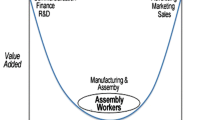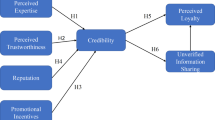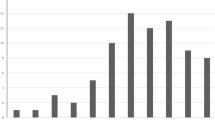Abstract
Working conditions in global supply chains have come under increased public scrutiny. Faced with this growing demand for accountability, some multinational enterprises have come to play regulatory roles in developing countries where they do business. This article combines quantitative and qualitative methods to examine the effects of reputation-conscious buyers on supplier labour standard compliance in the Cambodian garment sector. Using unique factory-level panel data, this article shows that factories producing for reputation-conscious buyers are associated with better compliance levels than other factories, controlling for factory characteristics. Field-based interviews also demonstrate that reputation-conscious buyers regulate supplier compliance both ‘reactively’ and ‘proactively.’ The findings shed light on the opportunities and limits of buyer-driven regulation.
L’attention du public est de plus en plus attirée par les conditions de travail dans la chaîne de valeur globale. Certaines firmes multinationales en viennent à jouer un rôle de régulation dans les pays où se situent leurs activités afin de répondre à cette exigence de responsabilité. Cet article combine des méthodes quantitatives et qualitatives dans le but d’examiner les effets des comportements « responsables » des acheteurs quant au respect des normes du travail par les fournisseurs dans le secteur du vêtement au Cambodge. A partir de données de panel originales au niveau de l’entreprise, cet article démontre que les entreprises produisant pour des acheteurs soucieux de leur image respectent mieux les normes internationales du travail que les autres entreprises, et ceci en utilisant les caractéristiques des firmes comme variables de contrôle. Des entretiens effectués sur le terrain soulignent également que les acheteurs soucieux de leur image ont un rôle de régulation vis-à-vis du respect des normes par les fournisseurs que ce soit grâce à leurs initiatives ou à leurs réactions. Les résultats mettent en évidence à la fois les opportunités et limites de la régulation par les acheteurs.


Similar content being viewed by others
Notes
For more information about the ILO monitoring programme, consult their website: http://www.betterfactories.org
The ILO monitoring programme has been mostly financed by international donors, namely the US Department of Labor, USAID, The World Bank, the Agence Française de Développement, as well as by the Cambodian Government, the Garment Manufacturers Association of Cambodia (GMAC) and international buyers. As the programme seeks to be self-sustaining beyond 2010, the financing scheme is set to change.
The category of labour relations is not included in the analysis because the problem of clustering distorts true compliance performance.
Recently, it is increasingly acknowledged that compliance is a limited measure of actual working conditions given the prevalence of audit fraud such as double-book keeping (Barrientos and Smith, 2007). Moreover, monitoring fundamental rights, including freedom of association, discrimination, child labour, remains a difficult task. Despite these challenges, ILO monitoring results in Cambodia's garment sector are the most comprehensive and reliable industry-wide data available on the general state of working conditions in garment factories.
The number of MSI buyers sourcing from the same factory is small, and thus this variable is highly correlated with the presence variable (>0.89), which is why it is dropped from regression analysis.
Factory management can also learn from training. The ILO provides various training on labour standards and human resource management to factories on a voluntary basis. As it is beyond the scope of this paper, this avenue may be explored in future work.
Figures from GMAC.
Although the types of unions may have made the difference for the outcome, data limitation precludes further investigation. ILO (2006) finds that independent unions are more helpful for workers than government-supported unions.
Interview with union federation leader, CCAWDU, 10 September 2007.
The agreement is available from the website of the ITGLWF: http://www.itglwf.org/DisplayDocument.aspx?idarticle=15317&langue=2.
Interview with training expert, 12 September 2008.
Interview with WRC investigator, 4 September 2007.
The WRC investigation report on this case is available from their website: http://www.workersrights.org/Freports/Update_Dec2006.asp#PCCS.
Interview with general manager, PCCS Garment, 21 June 2008.
Interview with WRC investigator, 4 September 2007.
Interview with union federation leader, CCAWDU, 10 September 2007.
Interview with union federation leader, FTUWKC, 26 September 2007.
Interview with official, Department of Occupational Safety and Health, 21 September 2007.
Interview with the Gap representative, 24 June 2008.
Interview with H&M representative, 16 October 2008.
Interview with factory manager, 11 September 2008.
Interview with factory manager, 16 September 2008.
Interview with factory manager, 21 June 2008.
Interview with factory manager, 14 October 2008.
Interview with factory manager, 21 June 2008.
References
Ashenfelter, O. and Smith, R.S. (1979) Compliance with the minimum wage law. Journal of Political Economy 87 (2): 333–350.
Barrientos, S. and Smith, S. (2007) Do workers benefit from ethical trade? Assessing codes of labour practice in global production systems. Third World Quarterly 28 (4): 713–729.
Barrientos, S., Dolan, C. and Tallontire, A. (2003) A gendered value chain approach to codes of conduct in African horticulture. World Development 31 (9): 1511–1526.
Bartley, T. (2005) Corporate accountability and the privatization of labour standards: Struggles over codes of conduct in the apparel industry. In: H. Prechel (ed.) Politics and the Corporation. Texas, OK: Elsevier, pp. 211–244.
Becker, G. (1968) Crime and punishment: An economic analysis. Journal of Political Economy 76 : 169–217.
Brady, H.E. and Collier, D. (eds.) (2004) Rethinking Social Inquiry: Diverse Tools, Shared Standards. Oxford: Rowman & Littlefield.
Bryson, A., Gomez, R., Kretschmer, T. and Willman, P. (2007) The diffusion of workplace voice and high-commitment management practices in Britain, 1984–1998. Industrial and Corporate Change 16 (3): 395–426.
CCC (Clean Clothes Campaign). (2009) Cashing in: Giant Retailers, Purchasing Practices, and Working Conditions in the Garment Industry. Amsterdam, the Netherlands: CCC.
Conroy, M.E. (2007) Branded: How the Certification Revolution is Transforming Global Corporations. Gabriola Island, BC: New Society Publishers.
Elliott, K.A. and Freeman, R.B. (2003) Can Labor Standards Improve under Globalization? Washington DC: Institute for International Economics.
Esbenshade, J. (2004) Monitoring Sweatshops: Workers, Consumers and the Global Apparel Industry. Philadelphia, PA: Temple University.
Freeman, R.B. and Medoff, J.L. (1984) What Do Unions Do? New York: Basic Books.
Frenkel, S.J. (2001) Globalization, athletic footwear commodity chains and employment relations in China. Organization Studies 22 (4): 531–562.
Frenkel, S.J. and Scott, D. (2002) Compliance, collaboration, and codes of labour practice: the ADIDAS connection. California Management Review 45 (1): 29–49.
Gereffi, G., Humphrey, J. and Sturgeon, T. (2005) The governance of global value chains. Review of International Political Economy 12 (1): 78–104.
Gerring, J. (2007) Case Study Research: Principles and Practices. Cambridge: Cambridge University Press.
Graham, D. and Woods, N. (2006) Making corporate self-regulation effective in developing countries. World Development 34 (5): 868–883.
Hughes, A., Buttle, M. and Wrigley, N. (2007) Organisational geographies of corporate responsibility: A UK-US comparison of retailers’ ethical trading initiatives. Journal of Economic Geography 7: 491–513.
ILO (International Labour Organization). (2006) Women and Work in the Garment Industry. Phnom Penh, Cambodia: ILO.
Jenkins, R., Pearson, R. and Seyfang, G. (2002) Corporate Responsibility and Labor Rights: Codes of Conduct in the Global Economy. London: Earthscan.
Jiang, B. (2009) Implementing supplier codes of conduct in global supply chains: Process explanations from theoretic and empirical perspectives. Journal of Business Ethics 85: 77–92.
Keck, M. and Sikkink, K. (1998) Activists Beyond Borders: Transnational Advocacy Networks in International Politics. Ithaca, NY: Cornell University Press.
Kolben, K. (2004) Trade, monitoring, and the ILO: Working to improve conditions in Cambodia's garment factories. Yale Human Rights & Development Law Journal 7: 79–107.
Kuruvilla, S. and Verma, A. (2006) International labor standards, soft regulation, and national government roles. Journal of Industrial Relations 48 (1): 41–58.
Locke, R.M. and Romis, M. (2006) Beyond Corporate Codes of Conduct: Work Organization and Labour Standards in Two Mexican Garment Factories. Cambridge, MA: John F. Kennedy School of Government, Harvard University. Corporate Social Responsibility Initiative Working Paper no. 26.
Locke, R.M., Qin, F. and Brause, A. (2007) Does monitoring improve labor standards? Lessons from Nike. Industrial and Labor Relations Review 61 (1): 3–31.
Nadvi, K. and Wältring, F. (2004) Making sense of global standards. In: H. Schmitz (eds.) Local Enterprises in the Global Economy: Issues of Governance and Upgrading. Northhampton, MA: Edward Elgar.
OECD (Organisation for Economic Co-operation and Development). (2008) OECD Employment Outlook. Paris, France: OECD.
O’Rourke, D. (2006) Multi-stakeholder regulation: Privatizing or socializing global labour standards? World Development 34 (5): 899–918.
Oxfam. (2004) Trading Away Our Rights: Women Workers in Global Supply Chains. Oxford: Oxfam.
Polaski, S. (2006) Combining global and local forces: The case of labor rights in Cambodia. World Development 34 (5): 919–932.
Rodriguez-Garavito, C. (2005) Global governance and labour rights: Codes of conduct and anti-sweatshop struggles in global apparel factories in Mexico and Guatemala. Politics and Society 33: 203–233.
Seidman, G. (2008) Transnational labour campaigns: Can the logic of the market be turned against itself? Development and Change 39 (6): 991–1003.
Stigler, G. (1970) The optimum enforcement of laws. Journal of Political Economy. 78 (3): 526–536.
Viscusi, W.K. (1979) The impact of occupational safety and health regulation. The Bell Journal of Economics 10: 117–140.
Vogel, D. (2005) The Market for Virtue: The Potential and Limits of Corporate Social Responsibility. Washington DC: Brookings Institution Press.
Weil, D. (2001) Assessing OSHA performance: New evidence from the construction industry. Journal of Policy Analysis and Management 20 (4): 651–674.
Weil, D. (2005) Public enforcement/private monitoring: Evaluating a new approach to regulating the minimum wage. Industrial and Labor Relations Review 58 (2): 238–257.
Weil, D. and Mallo, C. (2007) Regulating labour standards via supply chains: Combining public/private interventions to improve workplace compliance. British Journal of Industrial Relations 45 (4): 791–814.
Acknowledgements
Author thanks Mr Tuomo Poutiainen, Chief Technical Advisor of ILO Better Factories Cambodia (BFC) for support and provision of data, BFC staff for various support and interviewees for their generosity. She also thanks Rafael Gomez and anonymous referees for helpful comments on previous drafts of this article.
Author information
Authors and Affiliations
Rights and permissions
About this article
Cite this article
Oka, C. Accounting for the Gaps in Labour Standard Compliance: The Role of Reputation-Conscious Buyers in the Cambodian Garment Industry. Eur J Dev Res 22, 59–78 (2010). https://doi.org/10.1057/ejdr.2009.38
Published:
Issue Date:
DOI: https://doi.org/10.1057/ejdr.2009.38




